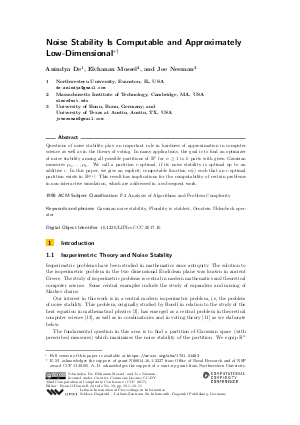Noise Stability Is Computable and Approximately Low-Dimensional
Authors Anindya De, Elchanan Mossel, Joe Neeman
-
Part of:
Volume:
32nd Computational Complexity Conference (CCC 2017)
Part of: Series: Leibniz International Proceedings in Informatics (LIPIcs)
Part of: Conference: Computational Complexity Conference (CCC) - License:
 Creative Commons Attribution 3.0 Unported license
Creative Commons Attribution 3.0 Unported license
- Publication Date: 2017-08-01
File

PDF
LIPIcs.CCC.2017.10.pdf
- Filesize: 0.54 MB
- 11 pages
Document Identifiers
Subject Classification
Keywords
- Gaussian noise stability; Plurality is stablest; Ornstein Uhlenbeck operator
Metrics
- Access Statistics
-
Total Accesses (updated on a weekly basis)
0Document
0Metadata
Abstract
Questions of noise stability play an important role in hardness of approximation in computer science as well as in the theory of voting. In many applications, the goal is to find an optimizer of noise stability among all possible partitions of R^n for n >= 1 to k parts with given Gaussian measures mu_1, ..., mu_k. We call a partition epsilon-optimal, if its noise stability is optimal up to an additive epsilon. In this paper, we give an explicit, computable function n(epsilon) such that an epsilon-optimal partition exists in R^{n(epsilon)}. This result has implications for the computability of certain problems in non-interactive simulation, which are addressed in a subsequent work.
Cite As Get BibTex
Anindya De, Elchanan Mossel, and Joe Neeman. Noise Stability Is Computable and Approximately Low-Dimensional. In 32nd Computational Complexity Conference (CCC 2017). Leibniz International Proceedings in Informatics (LIPIcs), Volume 79, pp. 10:1-10:11, Schloss Dagstuhl – Leibniz-Zentrum für Informatik (2017)
https://doi.org/10.4230/LIPIcs.CCC.2017.10
BibTex
@InProceedings{de_et_al:LIPIcs.CCC.2017.10,
author = {De, Anindya and Mossel, Elchanan and Neeman, Joe},
title = {{Noise Stability Is Computable and Approximately Low-Dimensional}},
booktitle = {32nd Computational Complexity Conference (CCC 2017)},
pages = {10:1--10:11},
series = {Leibniz International Proceedings in Informatics (LIPIcs)},
ISBN = {978-3-95977-040-8},
ISSN = {1868-8969},
year = {2017},
volume = {79},
editor = {O'Donnell, Ryan},
publisher = {Schloss Dagstuhl -- Leibniz-Zentrum f{\"u}r Informatik},
address = {Dagstuhl, Germany},
URL = {https://drops.dagstuhl.de/entities/document/10.4230/LIPIcs.CCC.2017.10},
URN = {urn:nbn:de:0030-drops-75390},
doi = {10.4230/LIPIcs.CCC.2017.10},
annote = {Keywords: Gaussian noise stability; Plurality is stablest; Ornstein Uhlenbeck operator}
}
Author Details
References
-
S. G. Bobkov. Isoperimetric problem for uniform enlargement. Studia Math, 123(1):81-95, 1997.

-
C. Borell. The Brunn-Minkowski inequality in Gauss space. Invent. Math., 30:207-216, 1975.

-
C. Borell. Geometric bounds on the Ornstein-Uhlenbeck velocity process. Z. Wahrsch. Verw. Gebiete, 70(1):1-13, 1985.

-
J. Corneli, I. Corwin, S. Hurder, V. Sesum, Y. Xu, E. Adams, D. Davis, M. Lee, R. Visocchi, N. Hoffman, and Robert M. Hardt. Double bubbles in gauss space and spheres. Houston Journal of Mathematics, 34(1):181-204, 2008.

-
A. De and R. Servedio. Efficient deterministic approximate counting for low-degree polynomial threshold functions. In Symposium on Theory of Computing, STOC 2014, New York, NY, USA, pages 832-841, 2014. Full version at http://arxiv.org/abs/1311.7178.

-
B. Ghazi, P. Kamath, and M. Sudan. Decidability of non-interactive simulation of joint distributions. In IEEE Symposium on Foundations of Computer Science (FOCS), pages 545-554, 2016.

-
S. Heilman, E. Mossel, and J. Neeman. Standard simplices and pluralities are not the most noise stable. Israel Journal of Mathematics, pages 1-21, 2014.

-
Steven Heilman. Euclidean partitions optimizing noise stability. Electron. J. Probab, 19(71):1-37, 2014.

-
M. Hutchings, F. Morgan, M. Ritoré, and A. Ros. Proof of the double bubble conjecture. Res. Announc. Amer. Math. Soc, 6:45-49, 2000.

-
M. Hutchings, F. Morgan, M. Ritoré, and A. Ros. Proof of the double bubble conjecture. Ann. of Math., 155:459-489, 2002.

-
G. Kalai. A Fourier-theoretic perspective on the Concordet paradox and Arrow’s theorem. Adv. in Appl. Math., 29(3):412-426, 2002.

-
S. Khot, G. Kindler, E. Mossel, and R. O'Donnell. Optimal inapproximability results for Max-Cut and other 2-variable CSPs? In Proc. 45th Annual IEEE Symposium on Foundations of Computer Science, pages 146-154, 2004.

- S. Khot, G. Kindler, E. Mossel, and R. O'Donnell. Optimal inapproximability results for max-cut and other 2-variable csps? SIAM J. Comput., 37:319-357, 2007. URL: http://www.stat.berkeley.edu/~mossel/publications/max_cut_final.pdf.
-
P. Kothari, A. Nayyeri, R. O'Donnell, and C. Wu. Testing surface area. In Proceedings of the Twenty-Fifth Annual ACM-SIAM Symposium on Discrete Algorithms, SODA 2014, Portland, Oregon, USA, January 5-7, 2014, pages 1204-1214, 2014.

-
M. Ledoux. Semigroup proofs of the isoperimetric inequality in Euclidean and Gauss space. Bull. Sci. Math., 118:485-510, 1994.

-
E. Mossel, R. O'Donnell, and K. Oleszkiewicz. Noise stability of functions with low influences: Invariance and optimality. Ann. Math., 171(1):295-341, 2010.

-
J. Neeman. Testing surface area with arbitrary accuracy. In Symposium on Theory of Computing, STOC 2014, New York, NY, USA, May 31 - June 03, 2014, pages 393-397, 2014.

-
Prasad Raghavendra and David Steurer. How to round any csp. In Foundations of Computer Science, 2009. FOCS'09. 50th Annual IEEE Symposium on, pages 586-594. IEEE, 2009.

-
Ben W. Reichardt, Cory Heilmann, Yuan Y. Lai, and Anita Spielman. Proof of the double bubble conjecture in r4 and certain higher dimensional cases. Pacific Journal of Mathematics, 208(2):347-366, 2003.

-
V. Sudakov and B. Tsirel’son. Extremal properties of half-spaces for spherically invariant measures. J. Soviet Math., 9:9-18, 1978. Translated from Zap. Nauchn. Sem. Leningrad. Otdel. Math. Inst. Steklova. 41 (1974), 14-21.

